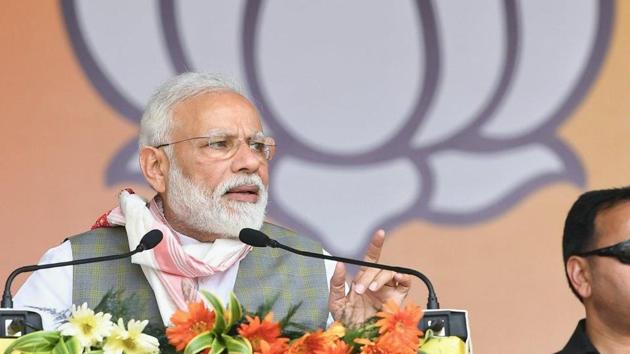Lok Sabha elections 2019: PM Modi, Mathura’s collage of faith and social identity
The PM’s persona is indeed a factor. The question is whether it can transcend social identities that bolster the alliance. Early ground reports suggest that of the five assembly segments, the Modi-BJP lure of 2014 might sustain in Mathura and Govardhan.
Such is the sociopolitical landscape of Mathura that my visit there for election coverage became a working pilgrimage. Be one an atheist, agnostic or a believer, it’s hard to stay untouched by the fervour of the faithful in this holy city and its twin, Vrindavan.

My first encounter with faith-driven political choices was at Mathura’s Vishram Ghat where mythology says Lord Krishna rested after killing his maternal uncle, Kamsa, and freeing his parents, Devaki and Vasudeva, from his captivity. It all began with a meeting I had at the Ghat with a boatman and a curiously named purohit (priest), Rasgulli Panda.
Sweet talkers both, they drew me into a pooja of the Yamuna before a boat ride on the hugely polluted river. What has Hema Malini done for Mathura if the river’s so dirty and the narrow approach road to the Dwarkadhish Temple so bumpy, I asked. My persistence elicited little by way of a cogent response; the duo praised her work, but did not get into specifics.
The impromptu tour of the Ghat and the temples on the river front lasted an hour. As I bid adieu, Rasgulli wanted to know whether Narendra Modi would return to power. My vague replies left him crestfallen. More a forbearing listener than a participant in the conversation, the boatman, when his turn came, demanded more money, saying he had taken me on a longer ride. For myself, I felt he took me for a ride.
Faith and the Modi factor
The understated boatman had the last word, and the last laugh! Pocketing twice the agreed fare, he said he’d again vote the PM: “Dhanyawaad, par mera vote tou Modiji ko hi jayega.”
Never mind the titter, the boatman’s comment was instructive, given the very discernible anti-incumbency against Hema Malini. The victory, if at all, won’t be hers or the BJP’s. It’ll be Modi’s.
The PM’s persona is indeed a factor. The question is whether it can transcend social identities that bolster the alliance. Early ground reports suggest that of the five assembly segments, the Modi-BJP lure of 2014 might sustain in Mathura and Govardhan; the BSP-SP-RLD alliance is finding resonance in the remaining three: Chata, Manth and Baldev. The MLA from Manth is the BSP’s Shyam Sundar Sharma.
The alliance’s candidate is Narendra Singh of the Rashtriya Lok Dal (RLD). His supporters from the Rajput community are at the forefront of his campaign. They’re likely to be force multiplied by the RLD and BSP’s equally combative Jat and Jatav vote base.
The contest’s real contours will emerge with the arrival in Mathura — slated to go to the polls on April 18 — of the RLD’s Ajit Singh and Jayant Chaudhary after the April 11 voting in their constituencies of Muzaffarnagar and Baghpat.
“If the Jats join the Rajputs (Thakurs), the RLD will get a boost,” said Yogesh Jadon, a Mathura-based journalist. In his analysis, the Modi factor helping Hema faced three counters within the local BJP: anti-incumbency; caste; and factionalism. It’s well known that a UP minister from the area, Shrikant Sharma, was a contender for the parliamentary ticket.
Caste and local anti-incumbency
I witnessed first hand the interplay of anti-incumbency and the Modi phenomenon at a security barricade near Vrindavan’s Prem Mandir, a tribute in marble to Lord Krishna’s mythological romance with Radha. Here, a motorcyclist stood arguing with a group of policemen. He jumped to Hema’s defence when another harried bystander predicted her defeat, bitter as he was about traffic being diverted to enable her campaign in the area. “Modi will take care of her election, you go watch [Haryanvi singer] Sapna Choudhary’s videos,” the motorcyclist mocked.
The policemen laughed as the resentful bystander pointed to Hema’s frowns, and her furrowed brows, both of which are a subject of discussion in Mathura.
To rub it in, he recalled the tradition of pilgrims being asked to laugh heartily during visits to temples in Vrindavan: “Jo Vrindavan mein hasey, uska ghar basey….jo Vrindavan mein roye, apne nayan khoye (Laugh for the prosperity of your families; weep at the risk of losing your eyesight).”
The picture was similar at a bhang (cannabis) outlet in Mathura where Sonu Rajput, the salesman, was a Modi fan. The one who was disagreeing was a Jat high on bhang mixed in jal jeera: “Make the starlet win and go searching for her in Mumbai…”
In 2014, Hema defeated Jayant Chaudhary in Mathura. The 5.74 lakh votes she polled were more than the aggregate share of the RLD (2.43 lakh), BSP (1.73 lakh) and the SP (36,000). That her less than impressive tenure as an MP could cost her votes, if not the seat, also found expression at the famous Banke Bihari temple. A young panda, Prashant Gautam, who helped me with the darshan at the crowded temple, was a Modi supporter. He nevertheless agreed that a section of his Brahmin clansmen could vote for the Congress’s Mahesh Pathak, who heads an influential body of Tirth Purohits (pilgrimage-priests). If that happens, that’ll cut into the BJP vote.
By some coincidence, the hotel where I stayed was Hema’s first home in Mathura. The hotel owner’s pet, a Saint Bernard, was then a small pup. It now weighs 80 kg and is four years old. It was named Bhola by Hema, who has since set up home at Vrindavan.
Opinion on her electoral prospects was as much divided among the hotel employees. To many of them, she was a reluctant politician fixated on her celebrity — not so much on her popularity. They saw first hand how inaccessible to the local people was the Dream Girl who’s 70 but looks 40.






